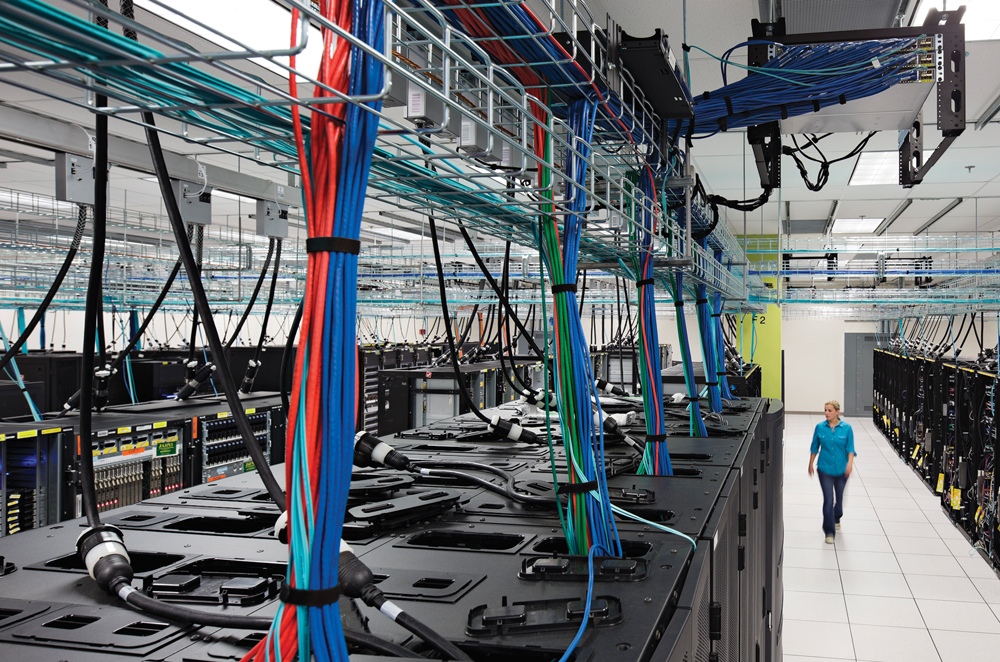While the once white-hot data center construction market has cooled off in recent years, the outlook for this sector remains quite rosy. Each year, businesses and institutions spend billions on data center construction and retrofit projects to keep up with the nation’s insatiable demand for data storage and processing.
The data center sector is conservatively estimated at $13-15 billion annually—larger than the hospitality, amusement/recreation, and water supply sectors, according to U.S. Census Bureau data. And the emergence of cloud computing and storage, combined with the “never delete anything” mindset of consumers and businesses, will only drive demand for data storage and processing.
“The data center market should generally follow the growth of Internet traffic, and Internet traffic continues to grow strongly,” says Craig Deering, AIA, LEED AP, National Practice Leader – Critical Facilities with HDR Architecture.
According to a May 2013 report from Cisco Systems, IP traffic volume in North America is expected to grow to 40 exabytes a month by 2017, a 23% cumulative annual growth rate. Cisco predicts global IP traffic will increase threefold over the next five years. Driving this steep growth are the explosion of networked devices, especially wireless gadgets, and the emergence of video as a dominant content type. Cisco predicts that traffic from wireless and mobile devices will exceed wired devices by 2016, and video will reach 69% of global consumer Internet traffic by 2017.
TOP DATA CENTER ARCHITECTURE FIRMS
2012 Data Center Revenue ($)1 Corgan $27,534,1912 Gensler $23,330,0003 HDR Architecture $16,295,0004 Integrated Design Group $14,598,9105 PageSoutherlandPage $14,450,0006 Reynolds, Smith and Hills $4,360,0007 Callison $3,973,6998 Little $3,655,5909 RTKL Associates $3,634,00010 EwingCole $3,000,000
TOP DATA CENTER ENGINEERING FIRMS
2012 Data Center Revenue ($)1 Fluor $235,678,9002 Syska Hennessy Group $36,735,4343 Jacobs Engineering Group $36,700,0004 H&A Architects & Engineers $35,427,5995 URS Corp. $26,229,0496 Environmental Systems Design $10,575,8927 Parsons Brinckerhoff $10,300,0008 H.F. Lenz $7,357,0009 Science Applications International Corp. $6,760,59810 AKF Group $6,602,000
TOP DATA CENTER CONSTRUCTION FIRMS
2012 Data Center Revenue ($)1 DPR Construction $895,882,4592 Balfour Beatty $753,194,2143 Holder Construction $710,000,0004 Turner Corporation, The $501,750,0005 Whiting-Turner Contracting Co., The $490,093,0456 Mortenson Construction $307,360,0007 Structure Tone $285,725,0008 Skanska USA $236,396,8589 Gilbane $130,362,00010 Carlson Design Construct $128,000,000
Giants 300 coverage of Data Centers brought to you by System Sensor www.systemsensor.com
What does this mean in terms of construction spending growth? If the Data Center Dynamics annual census of the industry is any indication, the data center construction market will remain one of the fastest-growing sectors in the country. According to DCD Intelligence’s most recent survey of nearly 3,800 data center owner/operators and 1,600 vendors, data center facility investment was up 23% on the Coasts and 50% in the central U.S. in 2011-12.
“Calculating the size of the data center market is challenging,” says Deering, “but no matter how you look at it, there’s no doubt that the data center market stands on its own as a distinct and meaningful sector.”
Achieving a lower cost of computing
Shrinking IT budgets and rising operational costs have led data center operators and corporate clients to scrutinize project budgets. As a result, AEC firms are being tasked with finding solutions for lowering the overall cost of computing and operating and maintaining the facilities.
This, in turn, is driving innovation in data center design, including the use of advanced cooling schemes, energy-efficient IT equipment, and higher-density environments. Advanced technologies like KyotoCooling, which utilizes heat wheels to reduce the cooling load on the building’s HVAC system, are becoming more common in U.S. data center projects. In addition, a growing number of data center operators are choosing to build new facilities in northern climates to take advantage of the cooler outdoor air temperatures.
Advancements in server technology, combined with a recent change to ASHRAE’s TC 9.9 Datacom guidelines, means that Building Teams can deliver facilities that operate at higher internal temperatures, greatly reducing cooling costs.
“The top end of the allowable range now is 80.6°F, up from 76°F previously,” says Ronald Vokoun, DBIA, LEED AP BD+C, Mission Critical Market Leader – Western Region with JE Dunn Construction. “Generally speaking, for every 1.8°F that you raise the temperature in your data center, you save 2-4% of your total energy bill. That’s a pretty high and immediate ROI.”
Rising costs are forcing many companies to outsource their data hosting through co-location and cloud services. This trend is leading to the construction of more mega-data center facilities, like CyrusOne’s new Chandler, Ariz., complex, which will eventually house more than
1 million sf of data center space. By 2015, just 2% of the world’s data centers will contain 60% of the floor space, up from 52% in 2010, according to a report from Gartner Inc.
“We will continue to see the concentration of data center floor space into a small community of dominant global players,” says HDR’s Deering.
Retrofits: A growth market
An emerging market for AEC firms is data center retrofits. The first wave of data centers—built during the dot-com boom of the late 1990s—are woefully outdated and are prime for retrofitting. Even the facilities built years later are behind the technology curve, and operators will be looking to upgrade their servers and infrastructure to meet the computing demands of today’s market.
“Many companies are looking at the ‘capex’ versus ‘opex’ dollars and realizing that they can strike a meaningful balance between the two by simply updating, retrofitting, or renovating their existing facilities,” says Jerry Sumrell, PE, Vice President, Mission Critical with RS&H. “This presents new challenges to the design industry, as we will be devoting more time to working in live data center environments with all of the associated risks that come with it. It’s akin to performing open-heart surgery—you have to keep the facility running 24/7 while adding new equipment, decommissioning existing equipment, and transferring power/cooling from one piece of equipment to another.”
Read BD+C's full Giants 300 Report
Related Stories
Multifamily Housing | Aug 21, 2024
Nation's leading multifamily developer expands into infrastructure
Greystar's strategy for infrastructure is driven by the shifting landscape of today's cities—primarily in the increased digitization, urbanization, and transitions to clean energy.
Building Materials | Aug 19, 2024
Federal 'buy clean' construction materials label program unveiled
The U.S. Environmental Protection Agency announced a plan for implementing a new label program to boost American production of more climate-friendly construction materials and products. The label program will prioritize steel, glass, asphalt and concrete.
Museums | Aug 19, 2024
The Tampa Museum of Art will soon undergo a $110 million expansion
In Tampa, Fla., the Tampa Museum of Art will soon undergo a 77,904-sf Centennial Expansion project. The museum plans to reach its $110 million fundraising goal by late 2024 or early 2025 and then break ground. Designed by Weiss/Manfredi, and with construction manager The Beck Group, the expansion will redefine the museum’s surrounding site.
Reconstruction & Renovation | Aug 19, 2024
Movement to protect historic buildings raises sharp criticism
While the movement to preserve historic buildings has widespread support, it also has some sharp critics with well-funded opposition groups springing up in recent years. Some opponents are linked to the Stand Together Foundation, founded and bankrolled by the Koch family’s conservative philanthropic organization, according to a column in Governing magazine.
Government Buildings | Aug 19, 2024
GSA posts new RFI for enabling energy efficiency, decarbonization in commercial buildings
The U.S. General Services Administration (GSA), in collaboration with the U.S. Department of Energy, recently released a new Request For Information (RFI) focused on enabling energy efficiency and decarbonization in commercial buildings. GSA wants to test innovative technologies through GSA’s Center for Emerging Building Technologies.
MFPRO+ New Projects | Aug 16, 2024
At 60 stories, the Paramount multifamily development will stand as Nashville’s tallest high rise
When complete, the 60-story Paramount building, at 750 feet high, will be the tallest high rise tower in Nashville, Tenn., surpassing the city’s current record holder, the 617-foot AT&T Building. The $390 million Paramount project recently launched condo sales after securing more than $230 million in construction financing.
Urban Planning | Aug 15, 2024
New York City begins first large-scale porous pavement installation
New York City is installing its first large-scale porous pavement installation along seven miles of roadway in Brooklyn. The project will keep 35 million gallons of stormwater out of the combined sewer system each year, according to a news release.
Curtain Wall | Aug 15, 2024
7 steps to investigating curtain wall leaks
It is common for significant curtain wall leakage to involve multiple variables. Therefore, a comprehensive multi-faceted investigation is required to determine the origin of leakage, according to building enclosure consultants Richard Aeck and John A. Rudisill with Rimkus.
MFPRO+ News | Aug 14, 2024
Report outlines how Atlanta can collaborate with private sector to spur more housing construction
A report by an Urban Land Institute’s Advisory Services panel, commissioned by the city’s housing authority, Atlanta Housing (AH), offered ways the city could collaborate with developers to spur more housing construction.
Adaptive Reuse | Aug 14, 2024
KPF unveils design for repositioning of Norman Foster’s 8 Canada Square tower in London
8 Canada Square, a Norman Foster-designed office building that’s currently the global headquarters of HSBC Holdings, will have large sections of its façade removed to create landscaped terraces. The project, designed by KPF, will be the world’s largest transformation of an office tower into a sustainable mixed-use building.

















